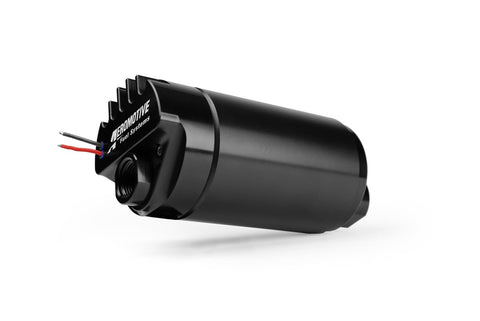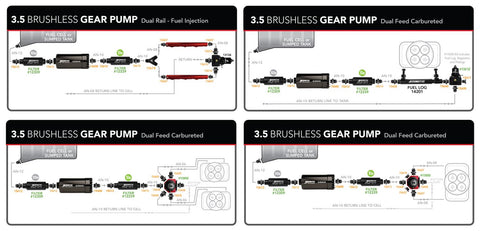

3.5 GPM Brushless In-Line Fuel Pump with True Variable Speed Controller
Regular price
$1,695.45 USD
P/N 11191: Brushless In-Line 3.5 Spur Gear Pump w/ Variable Speed Pump Controller
- The Pro-Series performance you expect and more:
-
Fuel injected engines: GAS
up to 2400 FWHP – naturally aspirated
up to 1800 FWHP – forced air induction
-
Carbureted engines: GAS
Up to 2600 FWHP – naturally aspirated
Up to 2000 FWHP – forced air induction
-
Fuel injected engines: E85
up to 1680 FWHP – naturally aspirated
up to 1260 FWHP – forced air induction
-
Carbureted engines: E85
Up to 1820 FWHP – naturally aspirated
Up to 1400 FWHP – forced air induction
-
Fuel injected engines: METHANOL
up to 840 FWHP – naturally aspirated
up to 630 FWHP – forced air induction
-
Carbureted engines: METHANOL
Up to 910 FWHP – naturally aspirated
Up to 700 FWHP – forced air induction
-
Fuel injected engines: GAS
- Lighter than the traditional Pro-Series pump.
- Reduced current draw at higher, EFI pressures.
- Extended service life in methanol and ethanol.
- New integral spur-gear pumping mechanism.
- 90-PSI continuous operating pressure and up to 150-PSI peak pressure, base plus boost.
- Integral, external brushless controller for clean installation, cooler fuel and enhanced reliability.
- This product is not legal for sale or use on emission-controlled vehicles except when used as a direct replacement part matching OEM specifications.
- ORB-12 inlet and ORB-10 outlet ports.
- Requires straight 12-VDC to 16-VDC power supply.
- Not compatible with pulse modulated systems or fuel pump speed controllers.
EFI Rated flow of 1,250 lbs./hr. @ 40 psi, 13.5 volts
Carb Rated Flow of 1,350 lbs./hr. @ 9 psi, 13.5 volts
Aeromotive’s True Variable Speed Controller offers the advantages of built-in pump speed control via a dedicated 0-5V analog DC input signal. The Controller capitalizes on our existing brushless technology by reducing fuel flow during low engine demand and decreasing an already low current draw, therefore minimizing both motor heat the introduction of environmental via reduced fuel recycling.
